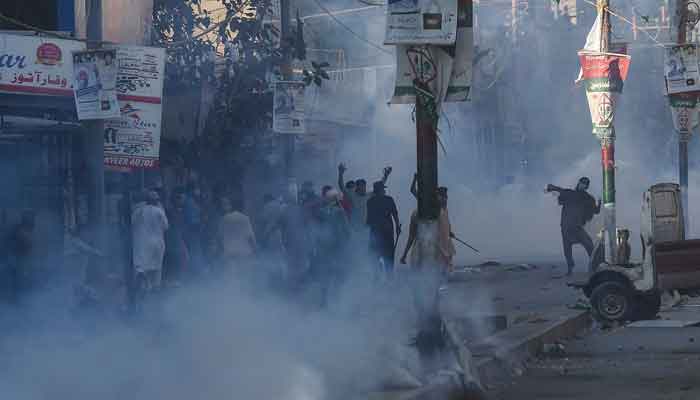What is the proper legal procedure to ban TLP?
Pakistan government's decision to outlaw TLP stirs up legal debate in country
May 10, 2021

Religiopolitical party Tehreek-e-Labbaik Pakistan (TLP) recently took to the streets across the country in violent protests. Hundreds of police officials were injured and four killed during clashes with the rioters.
As a result of the protests, the federal government banned the TLP on April 15, under Section 11B (1) of the Anti-Terrorism Act 199, which requires the government to have reasonable grounds to place a ban.
Expressing that it does, the government stated that it has reasonable grounds to believe that the TLP, among other things, was engaged in terrorism; acted in a manner prejudicial to the peace and security of the country; caused grievous bodily harm, hurt and death to law enforcement personnel and innocent by-standers; threatened, abused, and promoted hatred.
Therefore, due to this ban, the TLP is now no longer a political party. It can have its bank accounts seized, be prevented from collecting funds and organizing gatherings or conducting political activities.
TLP banned: What does it mean?
The decision to outlaw the TLP has also stirred up a legal debate in the country.
This is not the first time a political party has been banned in Pakistan. The first political party to be outlawed was the Communist Party of Pakistan in 1954, for trying to overthrow then prime minister Liaquat Ali Khan.
However, like the bans placed on political parties globally, the recent ban has been placed due to the party being a security threat, with their violent protests seen as terrorism-related activities.
But legal observers have become wary. The decision of the government to ban a political party is one which can be taken to court, specifically the Supreme Court. It is being questioned whether the ban under the terrorism laws will be approved by the court.
Furthermore, there is concern that such a decision has the potential to undermine other political parties on the whims of the government.
Senior counsel Salman Akram Raja has said that political parties block roads or bring out processions to achieve their political aims. He expressed that although there is no denying that parties which indulge in acts of terror and vandalize public properties should be dealt with an iron hand, it is dangerous to act without adhering to proper legal procedures against certain individuals.
Read more: Govt decides to ban TLP under anti-terror law
According to Section 212 of the Election Act 2017 and Article 17(2) of the Pakistani Constitution, which concerns the dissolution of a political party, the government is formally required to make a proper reference to the Supreme Court within 15 days after making the declaration against the concerned party.
This means that the apex court is the final arbiter. Yet, in lawyer Chaudhry Faisal Hussain’s opinion, banning TLP is the first step to dissolving the party, as the procedures of the SC will take some time.
Nevertheless, after the ban, the government of Prime Minister Imran Khan sat down to negotiate with the banned party in Lahore to debate and present a resolution in the National Assembly seeking the expulsion of the French ambassador and withdrawal of cases against TLP members.
This brought about a change, as the protests were called-off and the negotiations were termed as successful. The resolution observed that issues relating to international affairs should be resolved by the government.
It further prohibited any group from exerting pressure on the matter, adding that a specific venue for protests should be allocated as well so that routine life is not disturbed, and the government is called upon to hold detailed consultations with all the Muslim countries so that the issue can be taken up together at all international forums.
Furthermore, the constitution of a special committee of the House, comprising members from all parties, was also recommended, although this did invite strong protests from the Opposition.
Former PM Shahid Khan Abbasi observed that the resolution was insufficient; that a special committee is not required, but rather a committee of the whole House should be made. Nevertheless, the recommendation was approved and moved albeit not unanimously.
Read more: The future of TLP in Pakistan’s politics
Separately, Interior Minister Sheikh Rasheed, while presiding over a meeting held on April 30, decided to form a three-member committee to review the ban on the TLP.
This decision was made after Rasheed expressed on April 21 that although the ban will not be reversed, the party has 30 days to file an appeal against the government’s decision with the Ministry, which the party successfully did.
As of now, it remains unclear if the matter of banning the political party will be sent to the SC or not, and if the TLP will be allowed to contest future elections.
Sajjad is a law graduate from the University of London. She is currently a research officer at Centre for Law and Security.











